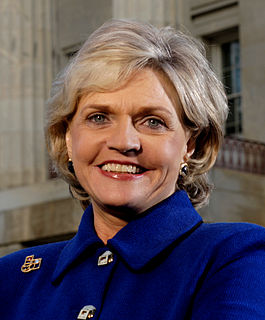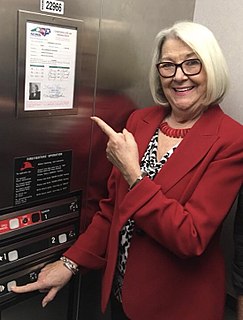
Walter H. Dalton is an American attorney and politician who served as the 33rd Lieutenant Governor of North Carolina. A member of the Democratic Party, he served six terms in the state senate before his election to the office of lieutenant governor in 2008.

Roy Asberry Cooper III is an American politician and attorney serving as the 75th Governor of North Carolina since January 1, 2017. A member of the Democratic Party, Cooper had previously served as the elected Attorney General of North Carolina since 2001. Prior to that, he served in the General Assembly in both the North Carolina House of Representatives and the North Carolina Senate.

Patrick Lloyd McCrory is an American businessman, politician, and radio host who served as the 74th Governor of North Carolina from January 2013 to January 1, 2017. He served as the 53rd Mayor of Charlotte from 1995 to 2009, and was appointed by President George W. Bush to the United States Homeland Security Advisory Council from 2002 to 2006.

The North Carolina gubernatorial election of 2008 was held on November 4, 2008, coinciding with the presidential, U.S. Senate, U.S. House elections, Council of State, and statewide judicial elections. Democrat Bev Perdue won the election.

James Carson Gardner is an American businessman and politician who served as a U.S. Representative (1967–1969) and as the 30th Lieutenant Governor of North Carolina (1989–1993).

The 2012 North Carolina gubernatorial election took place on November 6, 2012, concurrently with the 2012 United States presidential election, U.S. House election, statewide judicial election, Council of State election and various local elections.
The North Carolina Council of State elections of 2012 were held November 6, 2012 to select the nine officers of the North Carolina Council of State. This election coincided with the U.S. presidential election, U.S. House elections, the gubernatorial election and the statewide judicial elections. Primary elections were held on May 8, 2012; for races in which no candidate received 40 percent of the vote in the primary, runoff elections were held on July 17.

The 2016 North Carolina gubernatorial election was held on November 8, 2016, to elect the Governor of North Carolina, concurrently with the 2016 U.S. presidential election, as well as elections to the United States Senate and elections to the United States House of Representatives and various state and local elections.

Elections to the United States Senate will be held on November 3, 2020, with the 33 Class 2 seats of the Senate being contested in regular elections. The winners will be elected to six-year terms extending from January 3, 2021, until January 3, 2027. Additionally, there will be a special election in Arizona to fill the vacancy created by the death of John McCain in 2018.

The 2016 North Carolina lieutenant gubernatorial election took place on November 8, 2016, to elect the Lieutenant Governor of North Carolina, concurrently with the 2016 U.S. presidential election, as well as elections to the United States Senate and elections to the United States House of Representatives and various state and local elections. Primary elections were held March 15.
One justice of the seven-member North Carolina Supreme Court and five judges of the 15-member North Carolina Court of Appeals were elected by North Carolina voters on November 8, 2016, concurrently with other state elections. Terms for seats on each court are eight years.
The North Carolina Council of State elections of 2016 were held on November 8, 2016 to select the ten officers of the North Carolina Council of State. This elections coincided with the presidential election, elections to the House of Representatives, elections to the Senate and state elections to the General Assembly and judiciary. Primary elections were held March 15.

Elections to the United States Senate will be held on November 8, 2022 with 34 of the 100 seats in the Senate being contested in regular elections, the winners of which will serve six-year terms in the United States Congress from January 3, 2023 to January 3, 2029. Senators are divided into three groups, or Classes, whose terms are staggered so that a different class is elected every two years. Class 3 Senators were last elected in 2016, and will be up for election again in 2022.

United States gubernatorial elections will be held on November 3, 2020 in 11 states and two territories. In addition, special elections may take place if other gubernatorial seats are vacated. The last regular gubernatorial elections for nine of the eleven states took place in 2016. The last gubernatorial elections for New Hampshire and Vermont took place in 2018, as the governors of both states serve two-year terms. All state governors will be eligible for reelection except for Steve Bullock of Montana, although other governors may choose to retire. The 2020 gubernatorial elections will take place concurrently with several other federal, state, and local elections, including the presidential election.
The 2020 North Carolina lieutenant gubernatorial election is scheduled to take place on November 3, 2020, to elect the Lieutenant Governor of North Carolina, concurrently with the 2020 U.S. presidential election, as well as elections to the United States Senate and elections to the United States House of Representatives and various state and local elections. Primary elections would be held on March 3 under current law.
The 2020 United States House of Representatives elections in North Carolina will be held on November 3, 2020, to elect the 13 U.S. Representatives from the state of North Carolina, one from each of the state's 13 congressional districts. The elections will coincide with the 2020 U.S. presidential election, as well as other elections to the House of Representatives, elections to the United States Senate and various state and local elections.
A special election will be held in 2019 to fill the vacancy in North Carolina's 9th congressional district in the United States House of Representatives for the remainder of the 116th United States Congress. The seat has been vacant since the opening of the 116th Congress, following the refusal of the North Carolina State Board of Elections to certify the results of the November 2018 election in the district due to allegations of electoral fraud.
At least three justices of the seven-member North Carolina Supreme Court and five judges of the 15-member North Carolina Court of Appeals will be elected by North Carolina voters on November 3, 2020, concurrently with other state elections. Terms for seats on each court are eight years. These elections are conducted on a partisan basis.
A special election will be held in 2019 to fill the vacancy in North Carolina's 3rd congressional district in the United States House of Representatives for the remainder of the 116th United States Congress. Walter B. Jones Jr., the incumbent representative, died on February 10, 2019. Parties will hold primaries to decide their nominees. In order to win a party nomination outright, a candidate must exceed 30% of the vote to avoid a runoff. This means that for the Republican Party nomination the winning candidate would have to win over 5 times as many votes as the average votes received among the 17 candidates if no candidates withdraw. There must be 30 days of absentee voting prior to each election, according to state law. Filing began on March 4 and ended March 8, as set by Governor Roy Cooper. Cooper set the primary date of April 30. If needed, primary runoffs will occur on July 9, and the general election will be on September 10. However, if no primary runoffs are needed, the general election will occur on July 9.













